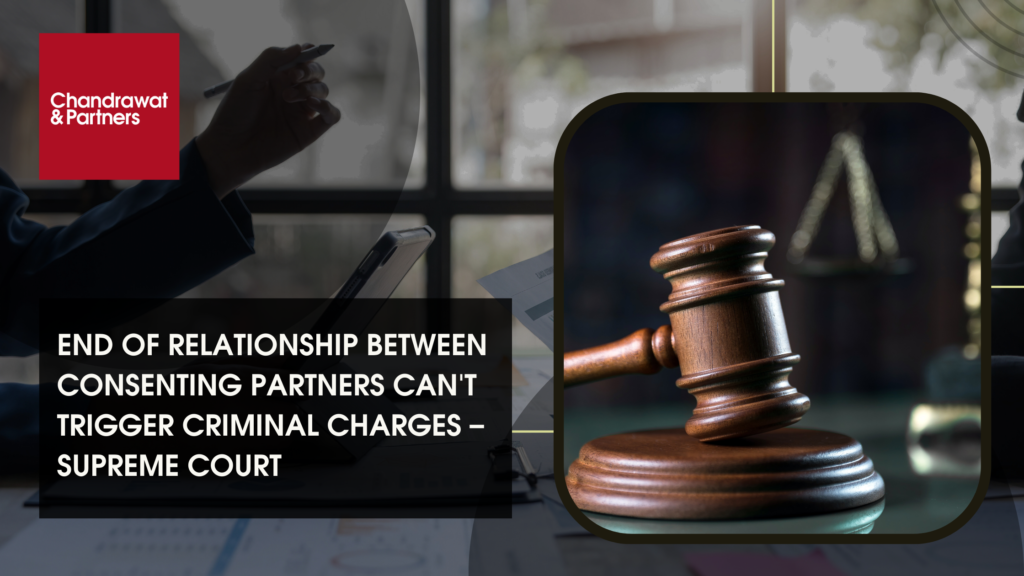Home > Recent Judgements > End Of Relationship Between Consenting Partners Can’t Trigger Criminal Charges – Supreme Court
Nov 22, 2024

BACKGROUND
In the case of Prashant V. State of NCT of Delhi, the complainant filed a FIR, saying that the appellant sexually exploited her under the false promise of marriage and forcibly engaged in sexual contact with her. She also claimed that the appellant had threatened to harm her family if she continued to have physical interactions with him.
The appellant petitioned the Delhi High Court to quash the FIR filed for alleged crimes under Sections 376(2)(n) and 506 of the Indian Penal Code (“IPC”). The High Court dismissed the petition, ruling that there was enough prima facie evidence to proceed with the case.
SECTION 376(2)(n)
Section 376(2)(n) of IPC is an offense that deals with the punishment for repeatedly raping the same woman:
- The punishment for this offense is rigorous imprisonment for a minimum of 10 years, or up to life imprisonment, along with a fine.
- Life imprisonment means imprisonment for the rest of the offender’s life.
SECTION 506
Section 506 of the IPC deals with criminal intimidation. The punishment for criminal intimidation under Section 506 is imprisonment for up to two years, a fine, or both. If the threat involves causing death, grievous hurt, or the destruction of property by fire, the punishment is imprisonment for up to seven years, a fine, or both.
The Supreme Court has ruled that to be convicted of criminal intimidation under Section 506, the accused must have intended to cause alarm to the complainant.
If the accused and the victim reach a compromise, the case can be dropped. It may also be possible to get bail with the help of an experienced lawyer.
JUDGMENT ANAYLSIS
The Court deemed the complainant’s assertions implausible. It stated that she continued to meet with the appellant despite the alleged forced sexual encounters, implying that the connection was consensual. In addition, the gatherings were composed of educated individuals.
There was no indication that the connection began with a pledge to marry.
A study of the FIR and the complainant’s testimony under Section 164 CrPC reveals no evidence that a promise of marriage was made at the start of their relationship in 2017. As a result, even if the prosecution’s case is accepted on its face, it cannot be argued that the complainant had a sexual relationship with the appellant only because the appellant promised to marry her. The court remarked that the parties’ relationship was friendly and consensual in character.
As stated in the preceding analysis, the facts as they stand, which are not in dispute, show that the elements of the offence under Sections 376 (2)(n) or 506 IPC are not proved in this case. The High Court erred in establishing that there was no consent on the part of the complainant and hence she was a victim of sexual assault over a period of time, and thus dismissed the application under Section 482 CrPC which gives the High Court the power to prevent abuse of the court process and ensure justice on wholly misconceived grounds. The facts of this case are appropriate for the High Court to have utilized its power under Section 482 CrPC to prevent abuse of the court’s process by continuing the prosecution,” the court ruled.
KEY OBSERVATION
The mere termination of a relationship between a consenting couple cannot result in the beginning of criminal proceedings. What was initially a consensual relationship between the parties cannot be criminalized if it does not fructify into a marital relationship. The Supreme Court dismissed a criminal case against a man accused of repeatedly raping a woman under the false pretense of marriage, stating that the non-materialization of a consenting relationship into marriage cannot be criminalized.
For more information or queries, please email us at
enquiries@chandrawatpartners.com




